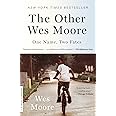I'm not one who usually reads "uplifting" true stories with words like "hope" prominently featured in the title or subtitle, but I gave this one a chance for three reasons. First of all, some of it takes place in neighboring Baltimore in the mid-'90s, which is interesting to anyone, like me, who loved the HBO series The Wire. Secondly, at lot of the kids who come into the library I work at are in the same position as the two young Wes Moores described in the book -- they might succumb to the call of the street, or they might not. Finally, it's short and quick -- if I'm going to read a book like this, I don't want it to be padded out to reach 300 page ideal (note that the final 80 pages of the book are a list of organizations across the country that work to improve the lives of disadvantaged youth).The premise of the book is that two young black men with the same name, coming up in roughly the same area, ended up in very different places in life. One is serving a life sentence for his role in a jewelry store heist in which a guard was killed, and the other ended up Rhodes Scholar and White House Fellow. The book came out of the latter one's desire to trace their histories and try and figure out why his life has worked out, while the other Wes's hasn't. He tells their life stories chronologically, alternating from himself to the incarcerated Wes, laying out the choices they made, and the context for those choices. He does this efficiently and fairly evocatively, managing to convey what goes on inside the heads of boys and young men without being overly analytical or judgemental. However, at the end, I was rather shocked to see him write the following of his grand investigation: "What made the difference?...The truth is that I don't know."Well, any reader of the book could tell him -- the difference is class. Both his parents were college educated, his mother was more involved in his life and had vastly greater financial resources to devote to him, and he had high-achieving siblings. That's pretty much it. When the eventually-successful Wes made some poor decisions as a kid, his mom was able to ask her parents for the money to put him first in private school, and eventually in an elite military academy. Once he prospered in that environment, doors started opening for him, as the network of connections started helping him up the ladder. The other Wes's mother had no financial or familial support to draw upon, and eventually lost control of her son, who main male role model was his drug-dealing half-brother.So, ultimately, there's not much of a lesson here, nor any kind of revelatory strategy for helping young black men. But it is a very instructive case study on how class mechanisms work in America, and what they mean in a tangible, concrete sense.






